| Listing 1 - 8 of 8 |
Sort by
|
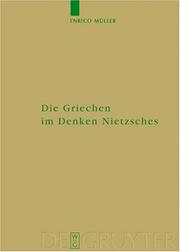
ISBN: 311018348X 9783110183481 3110921936 Year: 2005 Volume: Bd. 50 Publisher: Berlin de Gruyter
Abstract | Keywords | Export | Availability | Bookmark
 Loading...
Loading...Choose an application
- Reference Manager
- EndNote
- RefWorks (Direct export to RefWorks)
Enrico Müller legt die erste philosophische Gesamtdarstellung zur Bedeutung der Griechen für Nietzsches Denken vor. Er zeigt, wie sich in Auseinandersetzung mit der attischen Tragödie, der griechischen Kultur und den Vorsokratikern Nietzsches eigene Philosophie entwickelte, und problematisiert deren Abgrenzungen von der Logosphilosophie der griechischen Klassik. In der Interpretation des spannungsvollen Verhältnisses Nietzsches zu Sokrates und Platon kommt Müller zu dem Schluss, dass auch Nietzsches eigene Philosophie letztlich auf die Vorgaben der sokratisch-platonischen Dialektik angewiesen bleibt. Unter Bezugnahme auf die zeitgenössische gräzistische und althistorische Forschung wird eine erstaunliche Modernität der Ansätze Nietzsches sichtbar. Enrico Müller presents here the first overall philosophical account of the significance of the Greeks for Nietzsche’s thought. He demonstrates how Nietzsche’s own philosophy developed in his occupation with Attic tragedy, Greek culture and the Pre-Socratics and expounds the problems Nietzsche had in delineating his philosophy from the logos-based philosophy of Classical Greece. In his interpretation of the tense relationship between Nietzsche and Socrates and Plato, Müller concludes that in the final analysis Nietzsche’s philosophy remains bound to the models of Socratic-Platonic dialectics. Working from contemporary scholarship in Greek Studies and Ancient History, the astonishing modernity of Nietzsche’s approaches becomes apparent.
Greek drama (Tragedy) --- Philosophy and civilization. --- Philosophy, Ancient --- History and criticism. --- History. --- Philosophy and civilization --- Civilization and philosophy --- Civilization --- Ancient philosophy --- Greek philosophy --- Philosophy, Greek --- Philosophy, Roman --- Roman philosophy --- History and criticism --- Nietzsche, Friedrich Wilhelm --- Nietzsche, Friedrich --- Nietzsche, Friederich --- Influence. --- Nietzsche, Friedrich Wilhelm, --- Criticism and interpretation.

ISBN: 2747528170 Year: 2002 Publisher: Paris L'Harmattan
Abstract | Keywords | Export | Availability | Bookmark
 Loading...
Loading...Choose an application
- Reference Manager
- EndNote
- RefWorks (Direct export to RefWorks)
Stoics --- Philosophy, Ancient --- Rhetoric, Ancient --- Classical poetry --- Stoïcisme --- Philosophie ancienne --- Rhétorique ancienne --- Poésie ancienne --- History and criticism --- Histoire et critique --- Philosophy, Ancient. --- Stoics. --- History qnd ciriticism. --- Stoïcisme --- Rhétorique ancienne --- Poésie ancienne --- Rhetoric, Ancient. --- Ethics --- Ancient philosophy --- Greek philosophy --- Philosophy, Greek --- Philosophy, Roman --- Roman philosophy --- Classical literature --- History qnd ciriticism
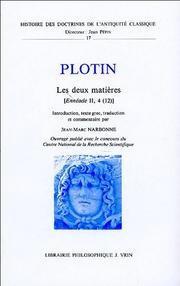
Abstract | Keywords | Export | Availability | Bookmark
 Loading...
Loading...Choose an application
- Reference Manager
- EndNote
- RefWorks (Direct export to RefWorks)
Matière (philosophie) --- Philosophie antique --- Plotin, --- Critique et interprétation --- Philosophy, Ancient --- Ancient philosophy --- Greek philosophy --- Philosophy, Greek --- Philosophy, Roman --- Roman philosophy --- Plotinus. --- Philosophy, Ancient. --- Matière --- Philosophie antique. --- Philosophie. --- Plotin --- Critique et interprétation. --- Matière --- Plotin (0205?-0270). --- Critique et interprétation. --- Philosophie --- Matter --- Philosophy.
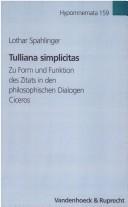
ISBN: 3525252587 9783525252581 Year: 2005 Volume: 159 Publisher: Göttingen Vandenhoeck und Ruprecht
Abstract | Keywords | Export | Availability | Bookmark
 Loading...
Loading...Choose an application
- Reference Manager
- EndNote
- RefWorks (Direct export to RefWorks)
Ancient philosophy --- Antieke filosofie --- Filosofie [Antieke ] --- Filosofie [Griekse ] --- Filosofie [Romeinse ] --- Filosofie van de Oudheid --- Greek philosophy --- Griekse filosofie --- Philosophie ancienne --- Philosophie antique --- Philosophie de l'Antiquité --- Philosophie grecque --- Philosophie romaine --- Philosophy [Ancient ] --- Philosophy [Greek ] --- Philosophy [Roman ] --- Roman philosophy --- Romeinse filosofie --- Dialogues, Latin --- Philosophy, Ancient --- Dialogues latins --- History and criticism --- Histoire et critique --- Cicero, Marcus Tullius --- Quotations --- Philosophy, Ancient. --- Citation --- Cicéron --- Cicero, Marcus Tullius.Cicéron (0106-0043 av. J.-C.) --- Technique --- Philisophie --- Philosophy, Greek --- Philosophy, Roman --- Cicero, Marcus Tullius. --- Cicero --- Cicerone, M. T. --- Cicéron, Marcus --- M. Tulli Ciceronis --- T︠S︡it︠s︡eron, Mark Tulliĭ --- Cyceron --- Cicéron --- Kikerōn --- Cicerón, M. Tulio --- Ḳiḳero --- Cicerone --- Cicerón, Marco Tulio --- Ḳiḳero, Marḳus Ṭulyus --- Tullius Cicero, Marcus --- Kikerōn, M. T. --- Cicerone, M. Tullio --- Cicero, M. T. --- Cyceron, Marek Tulliusz --- ציצרון, מארקוס טולליוס --- קיקרו, מארקוס טוליוס --- קיקרו, מרקוס טוליוס --- キケロ --- 西塞罗 --- Quotations. --- Histoire et critique. --- Technique. --- Philisophie.
Multi
ISBN: 2729500286 Year: 1977 Publisher: Lille : Atelier national de reproduction des thèses, université de Lille III,
Abstract | Keywords | Export | Availability | Bookmark
 Loading...
Loading...Choose an application
- Reference Manager
- EndNote
- RefWorks (Direct export to RefWorks)
Medicine, Greek and Roman --- Philosophy, Ancient --- Médecine grecque et romaine --- Philosophie ancienne --- Hippocrates --- Ancient philosophy --- Greek philosophy --- Philosophy, Greek --- Philosophy, Roman --- Roman philosophy --- Greek medicine --- Medicine, Roman --- Medicine, Unani --- Roman medicine --- Tibb (Medicine) --- Unani medicine --- Unani-Tibb (Medicine) --- Medicine, Ancient --- Hippokrates --- Abuqrāṭ --- Ippocrate --- Hippocrate --- Ipoḳrat --- Hippocrates, --- Ypocras --- היפוקראטס --- بقراط --- Hipócrates --- Theses --- Medicine, Greek and Roman. --- Philosophy, Ancient. --- Hippocrates. --- Médecine grecque et romaine
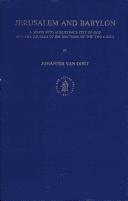
ISBN: 9004093230 9004253343 9789004093232 Year: 1991 Volume: 14 Publisher: Leiden Brill
Abstract | Keywords | Export | Availability | Bookmark
 Loading...
Loading...Choose an application
- Reference Manager
- EndNote
- RefWorks (Direct export to RefWorks)
Although many studies have been devoted to Augustine's City of God and its most important theme, viz. the antithesis between the civitas Dei and the terrena civitas ,until now no consensus has been reached concerning the sources of this doctrine. Was Augustine decisively influenced by Manichaeism, by (Neo)Platonism, the Stoa or Philo, by the Donatist Tyconius? Or should we look in another direction and refer to preceding Christian, Jewish, and especially to archaic Jewish-Christian traditions? This lucidly written books opens with a survey of the research carried out so far on the aim, structure and central theme of the City of God . Chapter 2 analyzes the essentials of Augustine's life, of his City of God , and of his doctrine of the two cities. Making use of one of the recently discovered letters of Augustine in Chapter 3 the author describes the City of God as an apology and as a catechetical work. Chapter 4 provides an investigation into the possible sources of Augustine's doctrine of the two cities in Manichaeism, in (Neo)Platonism, the Stoa and Philo, and in the works of Tyconius. The idea of two antithetical cities proves to be present most clearly in writings in which, closely related to Jewish thinking, archaic Christian concepts occupy an important place. In a final chapter some pertinent remarks are made on Jewish and Jewish-Christian influences on pre-Augustinian Christianity in Africa.
Ancient philosophy --- Antieke filosofie --- Filosofie [Antieke ] --- Filosofie [Griekse ] --- Filosofie [Romeinse ] --- Filosofie van de Oudheid --- Greek philosophy --- Griekse filosofie --- Kingdom of God --- Philosophie ancienne --- Philosophie antique --- Philosophie de l'Antiquité --- Philosophie grecque --- Philosophie romaine --- Philosophy [Ancient ] --- Philosophy [Greek ] --- Philosophy [Roman ] --- Rijk Gods --- Roman philosophy --- Romeinse filosofie --- Royaume de Dieu --- Apologetics --- Philosophy, Ancient --- Theology --- Apologétique --- Théologie --- Early works to 1800 --- Ouvrages avant 1800 --- Augustine, --- Kingdom of God. --- Philosophy, Ancient. --- History --- 276 =71 AUGUSTINUS --- -Apologetics --- -#GOSA:II.P.AU.3 --- #GROL:SEMI-276-05 Augu --- Apologetics, Missionary --- Christian evidences --- Christianity --- Evidences, Christian --- Evidences of Christianity --- Fundamental theology --- Polemics (Theology) --- Theology, Fundamental --- Religious thought --- Christian theology --- Theology, Christian --- Religion --- Philosophy, Greek --- Philosophy, Roman --- God, Kingdom of --- Eschatology --- God (Christianity) --- Latijnse patrologie--AUGUSTINUS --- -History --- -Evidences --- Augustine Saint, Bishop of Hippo --- Theses --- -Augustine Saint, Bishop of Hippo --- Apologétique --- Théologie --- #GOSA:II.P.AU.3 --- Augustine --- Primitive and early church, ca. 30-600 A.D. --- Apologetics - History - Early church, ca 30-600 --- Theology - History - Early church, ca. 30-600.
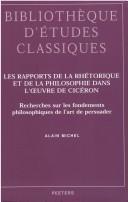
ISBN: 9042912723 9789042912724 2877237095 Year: 2003 Volume: 34 Publisher: Louvain Peeters
Abstract | Keywords | Export | Availability | Bookmark
 Loading...
Loading...Choose an application
- Reference Manager
- EndNote
- RefWorks (Direct export to RefWorks)
Cicero, Marcus Tullius --- Cicéron --- Latijnse letterkunde --- Littérature latine --- Retorica --- Rhétorique --- Persuasion (Rhetoric) --- Philosophy, Ancient. --- Rhetoric, Ancient. --- Argumentation --- Philosophie ancienne --- Rhétorique ancienne --- Criticism and interpretation. --- Philosophy, Ancient --- Rhetoric, Ancient --- Criticism and interpretation --- Classical languages --- Greek language --- Greek rhetoric --- Latin language --- Latin rhetoric --- Ancient philosophy --- Greek philosophy --- Philosophy, Greek --- Philosophy, Roman --- Roman philosophy --- Forensics (Public speaking) --- Oratory --- Rhetoric --- -T︠S︡it︠s︡eron, Mark Tulliĭ --- Cyceron --- Cicéron --- Kikerōn --- Cicerón, M. Tulio --- Ḳiḳero --- Cicerone --- Cicerón, Marco Tulio --- Ḳiḳero, Marḳus Ṭulyus --- Tullius Cicero, Marcus --- Kikerōn, M. T. --- Cicerone, M. T. --- Cicerone, M. Tullio --- Cicero --- Cicero, M. T. --- Cyceron, Marek Tulliusz --- ציצרון, מארקוס טולליוס --- קיקרו, מארקוס טוליוס --- קיקרו, מרקוס טוליוס --- キケロ --- 西塞罗 --- Theses --- -Criticism and interpretation --- -Cicero, Marcus Tullius --- Cicéron, Marcus --- Rhétorique ancienne --- Ancient rhetoric --- -Cicero --- History --- M. Tulli Ciceronis --- T︠S︡it︠s︡eron, Mark Tulliĭ --- Cicero, Marcus Tullius - Criticism and interpretation --- Persuasion (rhétorique). --- Rhétorique antique. --- Cicéron, --- Philosophie.
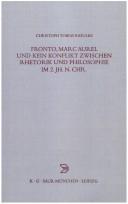
ISBN: 3598778309 311092918X Year: 2005 Volume: 218 Publisher: München Saur
Abstract | Keywords | Export | Availability | Bookmark
 Loading...
Loading...Choose an application
- Reference Manager
- EndNote
- RefWorks (Direct export to RefWorks)
Rhetoric and philosophy both constituted the main elements of literary education in the Greco-Roman world of the second century A.D. The present study deals with the relationship between both disciplines in Second Sophistic literature: Did there still exist a conflict between rhetors and philosophers in this time, or had the famous debate that originated from Plato's attack on the sophists ceased already for centuries? The author of this study tries to give an answer to this question: first examining the literary evidence of second century literature in general, then focussing on Fronto and Marcus Aurelius as the two most distinct participants in the debate, he proves that in the second century A. D. rhetoric and philosophy were totally in harmony with each other and that consequently Marc Aurelius never abandoned rhetoric for philosophy. Rhetorik und Philosophie bestimmen das Bildungsverständnis wie auch den Literaturbetrieb im römischen Reich der Hohen Kaiserzeit. In diesem Buch wird die Frage erörtert, in welchem Verhältnis beide Dis- ziplinen im 2. Jh. n. Chr. zueinander standen: War es ein harmonisches Verhältnis, oder wirkte die seit Platon bestehende Rivalität zwischen Philosophen und Rhetoren bis in diese Zeit nach? Der Autor untersucht im ersten Teil des Buches das Verhältnis zwischen Rhetorik und Philosophie im generellen soziokulturellen und literarischen Umfeld der Hohen Kaiserzeit, im zweiten Teil das Verhältnis zwischen zwei exponierten literarischen Gestalten dieser Zeit, nämlich zwischen dem Philosophenkaiser Marc Aurel und seinem Rhetoriklehrer Fronto. Im Gegensatz zur communis opinio der neueren Forschung kann der Autor aufgrund detaillierter philologischer Analyse nachweisen, dass es im 2. Jahrhundert keinen Konflikt zwischen Rhetoren und Philosophen mehr gab und dass auch Marc Aurel sich niemals von der Rhetorik abwandte. Das Buch richtet sich in erster Linie an ein Fachpublikum aus den Disziplinen der Klassischen Philologie und Alten Geschichte, darüber hinaus aber auch an all diejenigen, die sich für die Kultur und Literatur der römischen Kaiserzeit sowie für die Gestalt des Philosophenkaisers Marc Aurel interessieren.
Speeches, addresses, etc., Greek --- Sophists (Greek philosophy) --- Rhetoric, Ancient --- Philosophy, Ancient. --- Discours grecs --- Sophistes grecs --- Rhétorique ancienne --- Philosophie ancienne --- History and criticism --- History and criticism. --- Histoire et critique --- Fronto, Marcus Cornelius. --- Marcus Aurelius, --- Theory, etc. --- Sophists (Greek philosophy). --- Rhétorique ancienne --- Philosophy, Ancient --- Greek orations --- Greek speeches --- Ancient rhetoric --- Classical languages --- Greek language --- Greek rhetoric --- Latin language --- Latin rhetoric --- Ancient philosophy --- Greek philosophy --- Philosophy, Greek --- Philosophy, Roman --- Roman philosophy --- History and criticism&delete& --- Theory, etc --- Rhetoric --- Fronton --- Aurelius Antoninus, Marcus, --- Aurelius, Marcus, --- Mark Aurel, --- Marcus Aurelius Antoninus, --- Mark Avreliĭ, --- Marek Aureliusz, --- Marc Aurel, --- Marcus Antoninus, --- Antoninus, Marcus, --- Markos Antōninos, --- Marco Aurelio, --- Marḳus Aʼurelyus, --- Marḳus Orelyus, --- Marks Aurēlijs, --- מארקוס אורליוס --- מרקוס אורליוס --- מרקוס אורליוס, --- Μάρκος Ἀντωνῖνος, --- Ἀντωνῖνος, Μάρκος, --- Fronto --- Frontone --- Marcus Aurelius Antoninus --- Marcus Aurelius --- Fronto, Marcus Cornelius --- Fronto, M. Cornelius --- Frontone, M. Cornelio --- Frontone, Marco Cornelio
| Listing 1 - 8 of 8 |
Sort by
|

 Search
Search Feedback
Feedback About UniCat
About UniCat  Help
Help News
News